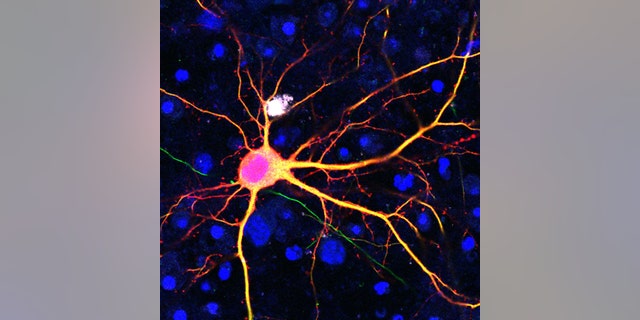A new genetic editing tool could give hope to people who suffer from Huntington’s disease and progeria, which causes premature aging, a study says.
Published in Cell Research, the study says researchers at Salk Institute have created a new tool, known as SATI, that enables them to edit the mouse genome and target a large swath of genetic mutations and cell types.
“This study has shown that SATI is a powerful tool for genome editing,” said Juan Carlos Izpisua Belmonte, a professor in Salk’s Gene Expression Laboratory and the study’s lead author, in a statement. “It could prove instrumental in developing effective strategies for target-gene replacement of many different types of mutations, and opens the door for using genome-editing tools to possibly cure a broad range of genetic diseases.”

Neuron targeted using the SATI technology. Credit: Salk Institute
Instead of replacing the trouble genes entirely, the researchers used SATI to put a good copy of one of the genes into a certain part of the mouse’s DNA. The gene is later inserted into the genome and essentially corrects the mutation without replacing the entire gene.
In the testing, scientists used SATI to correct the gene that is responsible for progeria in mice. Researchers said that they observed diminished aging in several organs, including the skin and spleen, as well as a 45 percent increase in the lifespan of the mice with the disease.
“We sought to create a versatile tool to target these non-coding regions of the DNA, which would not affect the function of the gene, and enable the targeting of a broad range of mutations and cell types,” Mako Yamamoto, one of the study’s co-authors, added. “As a proof-of-concept, we focused on a mouse model of premature aging caused by a mutation that is difficult to repair using existing genome-editing tools.”
Like progeria, Huntington’s disease is considered fatal, according to the Huntington Disease Society of America. The genetic disorder “causes the progressive breakdown of nerve cells in the brain” and deteriorates a person’s physical and mental abilities during their prime working years. Currently, there is no known cure.
A Salk Institute spokesperson told Fox News: “Huntington’s is mentioned as an example of the type of mutation this approach could potentially be applied to, but mice with Huntington’s were not involved and further study would be needed for the application of the SATI technology to that specific disease.”
FUTURISTIC GENE EDITING TECHNOLOGY MAY CAUSE CANCER
SATI is based off the CRISPR-Cas9 gene-editing technique and works with a wide range of gene-editing tools. George Church, professor of genetics at Harvard Medical School, is one of the inventors of CRISPR-Cas9.
“A similar extension of life span, when translated to humans, would be more than a decade,” the statement reads. “Thus, the SATI system represents the first in vivo gene correction technology that can target non-coding regions of DNA in multiple tissue types.”
Further down the line, the team wants to make SATI more efficient by increasing the number of cells that are incorporated into the DNA, thereby “boosting gains from the gene-editing procedure and potentially showing even more dramatic results.”
“Specifically, we will investigate the details of the cellular systems involved in DNA repair to refine the SATI technology even further for better DNA correction,” said one of the study’s co-authors, Reyna Hernandez-Benitez.

((Credit: iStock))
While somewhat controversial in that it’s capable of causing genetic damage according to one study, CRISPR has been credited with several biological and scientific achievements. These include eliminating viruses in pigs that could be harmful to people, which could lay the foundations for pig-to-human organ transplants.
The gene-editing tool has also been used to correct a disease-causing gene mutation in human embryos, preventing the mutation from passing to future generations.
